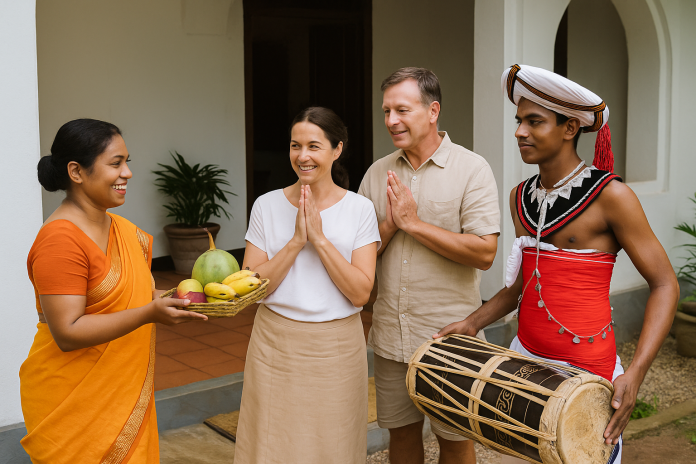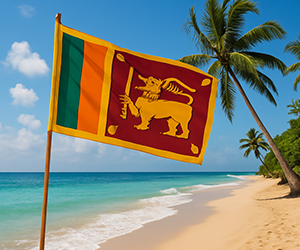1. Introduction to Sri Lankan Hospitality
Sri Lanka, an island nation adorned with lush greenery and centuries-old traditions, is renowned not just for its natural beauty but for the extraordinary warmth and friendliness of its people. Sri Lankan hospitality is an integral part of the island’s cultural identity—a genuine, heartfelt tradition that embraces visitors with kindness and care.
Hospitality in Sri Lanka is not merely a service; it is a philosophy deeply rooted in respect, generosity, and spiritual values. Whether you’re a foreign tourist or a local guest, the welcoming spirit is the same. From urban homes in Colombo to humble cottages in remote villages, Sri Lankans open their doors and hearts, offering more than just shelter or food—they offer a sense of belonging.
This article explores the many dimensions of Sri Lankan hospitality, its cultural roots, its impact on tourism, and its enduring charm in both traditional and modern settings.
2. Historical and Cultural Roots of Hospitality
The foundations of Sri Lankan hospitality can be traced back to ancient times. In early village societies, welcoming strangers was considered a moral duty. Influenced largely by Buddhist teachings, Sri Lankans believed in karma and the merit earned by treating others with kindness and compassion.
The concept of “Athithi Devo Bhava” (the guest is god), though more commonly associated with Indian culture, resonates strongly in Sri Lankan homes. This belief was fostered further by the multicultural influences of the island’s Sinhala, Tamil, Muslim, and Burgher communities. Each added their own flavor to the culture of generosity, ensuring that guests were not only accommodated but honored.
Temples and monasteries, from ancient Anuradhapura to the present day, have served as places of refuge for travelers and pilgrims. It became customary to offer food and lodging to anyone who sought it, reinforcing the virtue of selfless service that defines Sri Lankan hospitality.
3. Everyday Expressions of Hospitality in Sri Lanka
Hospitality in Sri Lanka is most beautifully experienced in the simplicity of daily life. When a visitor arrives at a home—invited or unannounced—it is customary to offer tea, snacks, or even a full meal. This is done not out of obligation, but with joy and pride.
Respectful greetings, such as clasped hands and the word “Ayubowan” (meaning “may you live long”), set the tone for meaningful interaction. Shoes are often removed before entering a home, and guests are encouraged to sit in the best seats available.
In rural communities, neighbors often support each other through shared meals and help during family events. Weddings, religious rituals, and even funerals see the entire community come together to cook, serve, and care for guests.
Stories of strangers being offered rides, directions, or help with accommodation are common in Sri Lanka. It is not unusual for a traveler to be invited to a family event or to stay overnight in someone’s home simply because they seemed in need.
4. Hospitality in Sri Lankan Tourism Industry
Sri Lanka’s booming tourism industry owes much of its success to the country’s legendary hospitality. Tourists consistently rate the friendliness of locals as a highlight of their visit.
Guesthouses and homestays, especially in regions like Ella, Sigiriya, and Galle, offer personalized care that often exceeds expectations. Hosts not only provide food and accommodation but also share cultural stories, local tips, and home-cooked meals.
Boutique hotels and luxury resorts in Sri Lanka are known for combining professional service with cultural authenticity. Staff are trained not just in etiquette but in emotional intelligence—making sure guests feel valued, safe, and connected.
Service in hotels and restaurants often includes extra touches: flower arrangements, handwritten notes, and flexible meal options. This attention to detail reflects the Sri Lankan ethos of treating guests with utmost respect.
- Keywords: Sri Lanka tourism hospitality, hotel hospitality Sri Lanka, Sri Lankan service industry
5. Hospitality in Sri Lankan Cuisine
Food is a central part of Sri Lankan hospitality. Meals are not just about nourishment; they are acts of love and sharing. When guests arrive, offering food is an immediate and natural gesture.
Tea is a symbol of welcome. No visit is complete without a cup of hot Ceylon tea, often served with sweets or local snacks like “murukku,” “kokis,” or banana chips.
Traditional meals like rice and curry, hoppers, kottu roti, and string hoppers are generously served at family gatherings. During the Sinhala and Tamil New Year (Avurudu), households prepare elaborate meal tables with traditional sweets like kiribath (milk rice), mung kavum, and aluwa, which are shared with neighbors and guests.
Weddings, birthdays, and religious observances also involve communal feasts where hospitality takes center stage.
- Keywords: Sri Lankan food and hospitality, traditional food culture Sri Lanka, Avurudu meal traditions
6. Rural vs Urban Hospitality in Sri Lanka
While the essence of hospitality is consistent across the island, its expression varies between urban and rural settings.
In rural areas, hospitality is more informal, spontaneous, and rooted in age-old customs. Villagers often share what little they have, offering fresh fruits, herbal drinks, and homemade dishes. The bond between host and guest can form quickly and deeply.
In urban centers, hospitality leans more toward structured etiquette. While city dwellers may not always invite strangers into their homes, they still uphold strong values of respect, helpfulness, and generosity. The use of digital platforms like Airbnb and PickMe also modernizes how guests are welcomed and served.
Anecdotes abound of travelers experiencing unexpected generosity in both village huts and city streets—proof that Sri Lankan hospitality transcends geography.
- Keywords: rural hospitality Sri Lanka, village culture Sri Lanka, city vs village hospitality
7. Hospitality in Religious and Cultural Events
Religion and culture play a major role in shaping Sri Lanka’s hospitable nature. During temple festivals, dansals (free food stalls) are set up along roads to serve anyone who passes by, regardless of religion or social status.
Pilgrimage sites like Adam’s Peak, Madhu Church, and Kataragama see devotees offering accommodation, food, and guidance to fellow pilgrims. Hospitality is seen as a spiritual act, earning merit and goodwill.
Hindu festivals like Thai Pongal and Muslim events like Eid involve preparing and distributing food to neighbors, relatives, and even strangers.
Esala Perahera, one of the grandest religious events in Kandy, becomes a hub of hospitality where entire neighborhoods participate in welcoming visitors from across the country.
- Keywords: religious hospitality Sri Lanka, dansal culture Sri Lanka, temple hospitality
8. Unique Aspects of Sri Lankan Hospitality Compared to Other Countries
What sets Sri Lankan hospitality apart from many other cultures is its genuineness. There is no transactional expectation; hospitality is extended as an intrinsic value.
Unlike the commercialized hospitality seen in many tourist destinations, Sri Lankans offer kindness spontaneously—even when there is no benefit involved.
The humility with which people serve tea, share stories, or give directions often leaves a lasting impact. Visitors frequently note that they came for the beaches or mountains but left with memories of the people.
- Keywords: Sri Lankan kindness, global comparison hospitality, Sri Lankan welcome culture
9. Hospitality Education and Professional Training
Sri Lanka recognizes the value of hospitality as both a cultural asset and a professional skill. Numerous vocational training institutes and universities offer courses in hotel management, culinary arts, and tourism services.
Institutions like SLITHM (Sri Lanka Institute of Tourism & Hotel Management) produce world-class professionals who work in leading hotels both locally and internationally.
These programs combine technical training with soft skills such as communication, empathy, and cultural sensitivity—ensuring that Sri Lanka’s reputation for hospitality continues to grow.
- Keywords: hospitality education Sri Lanka, hotel management Sri Lanka, tourism training
10. Future of Hospitality in Sri Lanka
The future of Sri Lankan hospitality lies in balancing tradition with innovation. As the tourism industry grows, there is a need to protect the authenticity of local experiences.
Digital platforms, eco-tourism, and sustainable travel practices are gaining popularity. Post-pandemic concerns have also increased the focus on hygiene, health protocols, and contactless service.
Despite these changes, the soul of hospitality remains unchanged: welcoming guests with sincerity. Future strategies must prioritize authentic cultural exchange, community-based tourism, and training the next generation in traditional values.
- Keywords: future of hospitality Sri Lanka, sustainable tourism Sri Lanka, authentic travel Sri Lanka
11. Conclusion: The Lasting Impression of Sri Lankan Hospitality
Sri Lankan hospitality is more than a practice—it is an emotion, an identity, and a lifelong impression. For centuries, the island has nurtured a culture where guests are cherished, and kindness is a daily ritual.
Whether experienced in a luxury resort or a village home, the warmth and generosity of Sri Lankan hosts leave an indelible mark on the hearts of visitors. In an age where authentic connections are rare, Sri Lanka continues to shine as a beacon of true, timeless hospitality.
- Keywords: unforgettable hospitality Sri Lanka, Sri Lankan warmth, guest experience Sri Lanka




